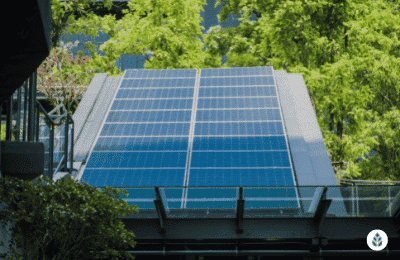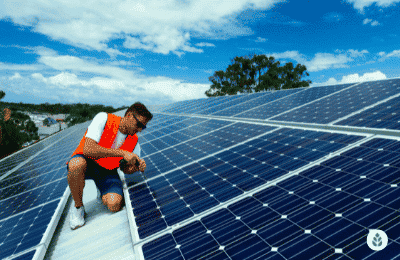
Is Solar Worth It in Indiana? (2024 Homeowner's Guide)
Here’s a quick overview of solar viability in Indiana:
- Indiana ranks 16th in the country for solar installations*
- The average electricity rate is 14.50 cents per kilowatt-hour (kWh)**
- The average solar payback period is 13 years***
- Homeowners are eligible for a beneficial net metering program and the federal solar investment tax credit (ITC)
- The average homeowner saves $25,365 over the lifetime of their solar system***
*According to the Solar Energy Industries Association.1
**Data from the Energy Information Administration.2
***Calculated assuming the system is purchased in cash.
Each product and or company featured here has been independently selected by the writer. You can learn more about our review methodology here. If you make a purchase using the links included, we may earn commission.
Solar energy is relatively prevalent in Indiana, in large part because of the solar-friendly policies throughout the state. The abundant sun and high energy needs of Hoosiers are both major factors as well that make solar conversion a worthwhile investment. Below, you’ll find information on how to decide if solar is right for your specific property, as the value of solar panels will vary depending on your electric company, shading on your property and many other factors. We’ll also include some information on the benefits of going solar in Indiana and some things you should think about throughout the process.
To speak with an EcoWatch-vetted professional who can help you determine whether solar is worth it for your Indiana home, follow the links below.

Blue Raven Solar
Pros
- Industry-leading in-house financing
- Competitive pricing
- Excellent reputation
Cons
- Doesn't offer solar batteries (coming 2022)

Blue Raven Solar
Pros
- Industry-leading in-house financing
- Competitive pricing
- Excellent reputation
Cons
- Doesn't offer solar batteries (coming 2022)

Icon Solar
Regional Service
Average cost
Pros
- Many years of experience
- Comprehensive service offerings
- Great warranty coverage
Cons
- No leases or PPAs
Watch Below: What Should You Know Before Going Solar?
How to Figure Out if Solar Panels are Worth It in Indiana
Most homeowners in Indiana will benefit from installing solar panels. However, this isn’t true for every resident, so it’s crucial to understand how to tell if your home is a good candidate. Below, we’ll discuss the most significant factors that play into the overall value of solar for your home.
What’s Your Home Electricity Consumption?
One of the first things you should consider is the amount of electricity you consume in an average month. Your energy consumption will not only determine the solar power system size you need and the price of it — potentially making paying off your panels a lengthy process — but also how valuable your panels will be in the long run. A general rule of thumb is that homes that consume more than 500 kWh in an average month are more likely to see a decent return on investment (ROI) when going solar. The more energy you use, the more valuable your panels will be. The average household in Indiana uses around 938 kWh per month, which means most residents will benefit from solar. You can check your past electric bills for usage history to see your average monthly consumption.
How Much Is It To Go Solar in Indiana?
The price of solar panels in Indiana averages around $3.66 per watt, which is quite a big higher than the national average. Indiana homeowners need similarly sized systems to most US homeowners, typically requiring a 9.5-kW system. That brings the total upfront price to $34,770 before the federal tax credit or $24,339 after the credit. While this is expensive, most solar panel systems in Indiana pay for themselves because energy usage is relatively high.
What’s the Payback Period for Solar in Indiana?

What Are Average Buy-Back Rates in Indiana?
Many states provide residents access to a mandated net metering program or an electricity buy-back program. These allow you to sell back any energy you produce and don’t use to your electric company for a credit to your monthly bill. Indiana does mandate net metering, although it doesn’t set a predetermined rate at which the energy must be purchased back by utility providers. If your electric company has a less favorable buy-back rate — significantly below the retail rate for energy — you might want to consider installing a solar battery along with your panels. An energy storage solution will help you offset electricity rates for energy used at night or on cloudy days when your panels are likely to underproduce for what you need.
How Much Sun Does Your Roof Receive?
Solar panels require sunlight to produce energy, which means homes that are hit with abundant and direct sunlight will benefit more from installing a solar energy system. Indiana receives an average of 187 sunny days per year, which is a bit below the national average of 205 days. For the most part, this is enough sun to make going solar worth the investment. However, there are some individual factors you’ll need to consider as well, as every house is different. The direction your roof faces, for example, can play a role in your panels’ worth, as south- and west-facing roofs receive the most sun in the United States. Additionally, you or your solar installer will need to consider shading on your property. Trees and buildings that obstruct the sunlight during peak production hours will make your system less valuable.
What’s the Outlook on Solar in Indiana?
Indiana ranks surprisingly high in terms of solar conversions by state, given the northern location in the country and the fewer-than-average sunny days the state gets annually. The solar-friendly policies throughout the state are really what make solar panels a good option for many homeowners in the area. Indiana’s Renewable Portfolio Standard (RPS) goals include producing at least 10% of all of its power from renewable energy sources by 2025. To that end, solar policies could become even more favorable in the near future. The likelihood is that the prevalence of solar will grow going forward, making converting even more accessible and affordable than it has been in the recent past.
Benefits of Solar Energy in Indiana
There are a number of benefits you’ll enjoy when you convert to solar energy in Indiana, including some financial perks and environmental upsides. We’ll discuss the most significant benefits of solar below.
Electricity Bill Savings
One of the most substantial financial benefits of solar panels is the reduced energy bills you’ll experience as a result of converting to clean energy. Solar panels produce electricity for your home, and with a favorable net metering policy, you could completely eliminate your utility bills. The average Indiana homeowner that converts to solar will not only pay off their system with energy savings over time but will also save an additional $25,365, on average, over the remaining lifespan of their equipment. You’ll also reduce your dependence on your electricity provider, meaning you can effectively lock in your energy rates for 25+ years and avoid spikes in per-kWh rates that are expected in the future.
Lower Taxes & Access to Other Incentives
Indiana residents are incentivized by both the state and federal governments to convert to solar energy via solar incentives. One of the most significant incentives is the federal solar investment tax credit, also called the ITC. The ITC is 30% of your total system expense — an average of $10,431 in Indiana — credited to your federal income tax liability for the year your solar panels are installed and turned on. There are some additional solar incentives available in Indiana, which are listed below:
- Net Metering: Net metering is mandated throughout Indiana, which means all solar owners can reduce their energy bills with overproduced power from their solar panels.
- Renewable Energy Property Tax Exemption: This property tax exemption prevents your property taxes from going up when installing solar even though your panels will bump up your home value.
- Sales and Use Tax Exemption for Electrical Generating Equipment: This sales tax exemption prevents you from having to pay sales tax on your solar equipment or installation expenses. In Indiana, where the state sales tax is 7%, this constitutes significant savings.
- Indiana Solar Easements & Rights Laws: These solar-friendly laws guarantee access to solar installation and sunlight for all taxpayers, even those located in strict HOAs or municipalities.
Home Resale Value Increase
One of the most substantial financial incentives that many homeowners fail to consider is the bump in property value your panels provide. According to data from Zillow, the average home value will go up by around 4.1% after solar conversion.3 Given the average home value of $228,879, that’s a typical increase of $9,384. This value jump could be even more substantial in more populated areas, like Indianapolis. It should be noted that solar leases and power purchase agreements will not provide this same benefit. Your home value will only increase if you purchase or finance your solar panels. Additionally, this benefit is particularly valuable in Indiana, as the state waives property taxes on the value added by solar equipment.
Clean, Renewable Energy
Finally, you’ll be doing your part to ease our strain on the environment when you go solar. You’ll reduce your reliance on fossil fuels, reduce your contribution to pollution and help slow down global warming. Of course, you’ll also enjoy more energy independence, which means you won’t have to deal with rising electricity rates from your power company.
What to Look Out For When Considering Solar in Indiana
Determining if solar is right for your home is an important step, but it’s just the first one. Once you decide to go solar, there are several other things you’ll want to consider. We’ll discuss some other things you need to know about the process below.
Upfront Fees

Payback Period
It’s highly recommended that you use a solar calculator to estimate your payback period or have an experienced solar installer estimate it for you. You can determine how valuable panels will be for your home using this number alone in many cases — below 13 years means panels are likely a great option, while above 15 years means your ROI will be lower than average. The shorter your payback period, the sooner your energy savings will pay off the system and the higher your total savings will be over time.
Net Metering Policies in Indiana
As we mentioned above, net metering is mandated in Indiana, but the policy specifics — like the rate at which your excess energy is purchased — can vary widely based on your provider. We recommend you check with your electric company before committing. Remember, you can install a solar battery to help offset electric bills if your net metering policy is less favorable. This equipment will add significantly to your upfront fees but will likely be worth it over time. Still, the specific policy isn’t usually a make-or-break factor for going solar.
Pending Policies & Changes to Incentives
The solar industry is well-established in Indiana and throughout the country, but it’s still relatively young and is expanding and improving. As such, some states will likely become more solar-friendly as adoption increases. While it’s not a great idea to wait around for better incentives or rebates to come along, you should look for updates to policies and incentives before moving forward with your home solar project.
Weather & Climate in Indiana
Indiana residents are usually well-aware that sunny days are less prevalent in the area than in most states throughout the country, with an average of 187 annually. Solar panel efficiency can drop as low as 10% on very cloudy days, meaning solar will be better suited for many other areas in the country than Indiana. Still, this is generally enough sunlight for many residents to offset their electric bills with the assistance of net metering. Some homeowners still worry that the northern location of Indiana is also not conducive to solar panel installation, as sunlight is less intense and plentiful as you move away from the equator. Again, the geographic location isn’t ideal, but energy flows more quickly in the cold, so your panels can still maintain a decent efficiency even through the long, cold Indiana winters.
Companies Pushing Solar Leases or PPAs
Finally, you should be aware that not every solar panel installation company is created equal, and you’ll need to be careful to choose one that will look out for your best interests. Companies that offer “free panels” — which are really just lease agreements — or push leases and power purchase agreements (PPAs) should typically be avoided. Solar leases are far less beneficial than cash purchases or solar loans. They don’t bump up your home value, they prevent you from taking the federal solar tax credit and the return on investment is typically much lower overall. Unfortunately, some disingenuous solar installers in Indiana have given solar a bad name. CBS 4 Indy has reported on solar scams that leave customers with even higher energy bills after installation.5 South Central Indiana REMC has also warned customers of solar scam companies claiming to be affiliated with REMC or other power providers to get customers to sign fraudulent contracts or less beneficial solar lease agreements.6 Above all else, make sure you only work with a reputable and vetted solar company to ensure a positive experience.
Wrap Up: Is Solar Worth it in Indiana?
Most homeowners in the Hoosier State will find that installing solar panels provides them with massive financial benefits and help reduce their carbon footprint. However, the promise of energy savings and a positive ROI isn’t in the cards for every homeowner. Rather than installing panels and hoping for the best, it’s wise to use a solar calculator or have a professional help determine if solar is worth it for your home. Important considerations include the direction your roof faces, shading on your property, your average monthly energy bills, the size of the system you need, and more. We strongly recommend contacting a reputable solar installation company to assist you with the planning and installation.
See also: Find out how much solar power your roof can produce with our solar calculator
Read More About Going Solar
- What Are the Best Solar Companies in Indiana?
- What Indiana Solar Incentives Are Available in 2022?
- Find Cost Savings on Solar in Indiana
The cost information presented in this article is derived from a comprehensive analysis, incorporating data from multiple industry sources. The average cost per watt per state was calculated based on figures from Consumer Affairs, Energy Sage, and Berkeley Lab’s Electricity Markets & Policy Department. Additionally, monthly energy consumption and the average monthly cost of electricity were sourced from the U.S. Energy Information Administration, ensuring a well-rounded and accurate representation of the information presented.
Frequently Asked Questions
The EcoWatch team is pleased to get questions regularly from Indiana homeowners wondering if solar is right for them. Below are some of the questions we see most often, along with our responses. If you have specific questions that aren’t answered here, reach out to our team of solar experts at solar@ecowatch.com.
The answer to this question will depend on a number of factors specific to your home, including your average monthly energy bills, your roof orientation and size, the energy efficiency of your home, the net metering program offered by your utility company, and much more. Most Indiana residents find that their systems pay for themselves within around 13 years, with any time between 9 years and 15 years being normal.
In the majority of cases, yes, going solar in Indiana will save you money. Provided your solar system is sized appropriately for your home and energy needs, your system will eventually pay for itself and continue to provide you with savings over the 25+ years of expected life. The average Indiana resident experiences a savings of $25,365 from going solar, and this is after the panels pay themselves off!
Yes! Installing solar panels in Indiana will bump up your home value by an estimated 4.1%, according to data from Zillow. In Indiana, that’s an average value increase of $9,384. It should be noted that this value increase only occurs if you purchase your panels outright or use a solar loan to pay for them. Solar leases and power purchase agreements will not bump up your property value and could make your home less appealing to buyers.
Yes, permits are a requirement for all photovoltaic equipment installations in Indiana, but your solar installer will likely handle all of the red tapes for you. Permitting helps ensure that the installation and connection between your inverter and the electrical grid are done properly.
You can install your own solar panels in Indiana, but it’s not recommended. DIY panel installation for a rooftop solar project is dangerous and could lead to injury or thousands of dollars in property or equipment damage. It’s advisable to let a professional installer handle the work for you, even if you’re an experienced DIYer.
Top Solar Installers in Indiana Cities
Comparing authorized solar partners
-
- Industry-leading in-house financing
- Competitive pricing
- Excellent reputation
- Doesn't offer solar batteries (coming 2022)
A+Best Solar Financing2014Trina Solar, Canadian Solar, SolarEdge, Silfab, SunPower25-year manufacturer warranty; 10-year workmanship warranty, 2-year production guarantee
Having trouble deciding? Click below and use our process to receive multiple quotes instead:

 233k
233k  41k
41k  Subscribe
Subscribe 





